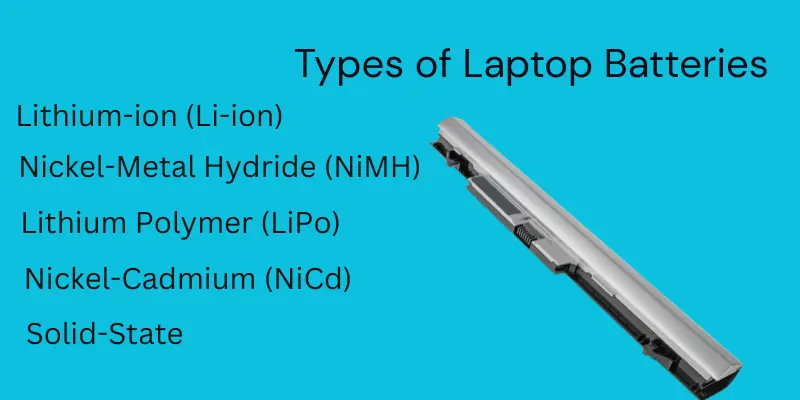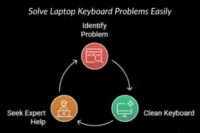Types of Laptop Batteries: Li-ion, LiPo, NiMH, and More Explained
Published: 15 Apr 2025
Laptop batteries act as the heart of your device—they power everything, but we frequently underestimate their value until something goes wrong. If you’re wondering why your battery drains too rapidly or doesn’t keep a charge, you must consider the battery type your laptop uses. The three most common types of batteries are lithium-ion (Li-ion), nickel-metal hydride (NiMH), and lithium polymer (LiPo). Let’s look at the different types of laptop batteries—understanding them may help you extend your laptop’s life and improve its performance.
Main Types of Laptop Batteries
Understanding these types can help you choose the right one for your needs. Let’s look at the five most common laptop batteries you may encounter.

Lithium-ion (Li-ion) Batteries
The lithium-ion (Li-ion) battery is a popular and commonly used type of laptop battery. These batteries are lightweight, efficient, and long-lasting, making them ideal for everyday usage. If you’ve ever used a laptop, it probably features a Li-ion battery. These batteries typically last between 2 and 4 years before losing some of their charge-holding capacity. Laptop battery sizes for Li-ion batteries vary depending on the laptop’s design, although they are generally intended to balance portability and performance.
Nickel-Metal Hydride (NiMH) Batteries
Although they are less commonly used today, NiMH batteries were previously the preferred option for laptop manufacturers. These batteries are more environmentally friendly and cheaper to make, but they are bigger and have a shorter lifespan than Li-ion batteries. If you’re using an older laptop, it may still use a NiMH battery, which requires more frequent replacement than current options.
Lithium Polymer (LiPo) Batteries
Lithium Polymer (LiPo) batteries are another type of Li-ion battery that is distinguished by its flexible architecture. These thinner batteries can be built to go inside ultra-thin laptops or ultrabooks. While LiPo batteries are more expensive and prone to overheating, they provide lightweight, compact options for those seeking simplified designs. Devices such as the MacBook Air and Microsoft Surface use LiPo batteries to keep their designs lightweight and portable.
Nickel-Cadmium (NiCd) Batteries
These older laptop battery types have been replaced mainly by Li-ion and NiMH batteries, while some older computers may still use them. NiCd batteries can control extreme temperatures, but they are prone to the “memory effect,” which means they can lose their ability to maintain a charge if not fully discharged regularly. While NiCd batteries are now uncommon in modern devices, they were once common in many early laptop models.
Solid-State Batteries
Solid-state batteries are a new invention that can potentially transform the future of laptop batteries. Unlike Li-ion and NiMH batteries, solid-state batteries don’t use liquid electrolytes. Instead, they use a solid electrolyte, which could result in improved energy efficiency, longer lifespan, and increased safety. Although still in development and not widely used in laptops, this new type of battery has the potential to improve battery technology significantly.
How to Choose the Right Battery for Your Laptop
Choosing the right battery can affect how long your laptop lasts and how well it performs. Here’s what to keep in mind:
What Will You Use Your Laptop For?
If you just need it for schoolwork and browsing, a Li-ion battery is enough. But if you need your laptop for heavy tasks like gaming or video editing, consider a LiPo battery for more power and longer use.
Battery Life
Li-ion batteries usually last 6-10 hours on a charge, making them great for daily use. LiPo batteries are smaller and fit in thin laptops but might not last as long.
Size and Weight
Li-ion batteries are light and compact. If you want a thin and light laptop, LiPo batteries are ideal because they’re slim and flexible.
Price
Li-ion batteries are affordable. LiPo batteries are more expensive but are great for slim designs. NiMH batteries are cheaper but don’t last as long.
Manufacturer Recommendations
Always check the manufacturer’s guidelines to make sure you’re using the correct battery type for your laptop.
Also Read This Articles
8 Different Types of Microphones
10 Types of Computer Keyboards
Discover the Laptop Screen Types
Discover the Different Types of Webcams
Discover Different Types of Laptops| Choose the Best for You
10 Types of Speakers and Their Uses
10 Common Types of Computer Viruses
Types of Laptop Chargers Explained
10 Different Types of Computer Mouse
Explore All Laptop Accessory Types
Top 5 Types of Laptop Bags for Students and Professionals
10 Types of Laptop Ports | Which Ones Do You Really Need?
Types of Laptop Processors Learn Intel Core, Dual Core, AMD
When choosing a battery for a school laptop, Li-ion batteries are the best option. They are reliable, last longer, and are affordable. Since most school laptops are designed for everyday tasks like writing, browsing, and watching videos, Li-ion batteries strike a great balance between performance and cost.
The lifespan of a laptop battery varies depending on the type. Li-ion batteries generally last about 2 to 4 years, but this can depend on usage and care. Other battery types like NiMH and NiCd may have shorter lifespans, requiring replacement sooner.
It depends on the laptop. Many laptops, especially older models, allow you to easily replace the battery. However, newer models, like the MacBook Pro, often have non-removable batteries that need professional help for replacement.
To extend your laptop battery’s life, avoid draining it completely before recharging. Keeping your battery between 20% and 80% is ideal. Also, try reducing your screen brightness and closing unused applications to save power.
Conclusion
Understanding all types of laptop batteries is essential, whether purchasing a new laptop or replacing an old one. Each type of battery has advantages and disadvantages, ranging from the most prevalent Li-ion batteries found in laptop computers to the getting of solid-state batteries. Choosing the proper battery category is determined by your laptop’s design, usage, and budget. Taking proper care of your battery will help it last longer and perform better over time.

- Be Respectful
- Stay Relevant
- Stay Positive
- True Feedback
- Encourage Discussion
- Avoid Spamming
- No Fake News
- Don't Copy-Paste
- No Personal Attacks



- Be Respectful
- Stay Relevant
- Stay Positive
- True Feedback
- Encourage Discussion
- Avoid Spamming
- No Fake News
- Don't Copy-Paste
- No Personal Attacks





